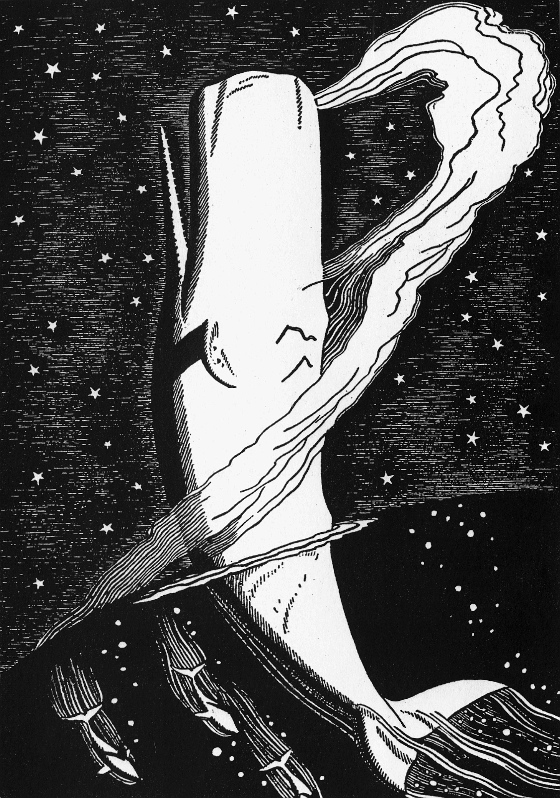D.H. Lawrence on the white race’s fanatical destruction of itself.

Moby Dick, illustration by Rockwell Kent
In Herman Melville’s
Moby Dick (1851), the author is explicit about what the White Whale means to Captain Ahab who is hunting him across the world:
All that most maddens and torments; all that stirs up the lees of things; all truth with malice in it; all that cracks the sinews and cakes the brain; all the subtle demonisms of life and thought; all evil, to crazy Ahab, were visibly personified, and made practically assailable in Moby Dick. He piled upon the whale’s white hump the sum of all the general rage and hate felt by his whole race from Adam down; and then, as if his chest had been a mortar, he burst his hot heart’s shell upon it.
But D.H. Lawrence, in his
essay on
Moby Dick in
Studies in Classic American Literature (1923), has a startlingly different, yet not unrelated, interpretation of the whiteness of the whale:
What then is Moby Dick? He is the deepest blood-being of the white race; he is our deepest blood-nature.
And he is hunted, hunted, hunted by the maniacal fanaticism of our white mental consciousness. We want to hunt him down. To subject him to our will. And in this maniacal conscious hunt of ourselves we get dark races and pale to help us, red, yellow, and black, east and west, Quaker and fireworshipper, we get them all to help us in this ghastly maniacal hunt which is our doom and our suicide.
Here is the entire passage:
The terrible fatality.
Fatality.
Doom.
Doom! Doom! Doom! Something seems to whisper it in the very dark trees of America. Doom!
Doom of what?
Doom of our white day. We are doomed, doomed. And the doom is in America. The doom of our white day.
Ah, well, if my day is doomed, and I am doomed with my day, it is something greater than I which dooms me, so I accept my doom as a sign of the greatness which is more than I am.
Melville knew. He knew his race was doomed. His white soul, doomed. His great white epoch doomed. Himself, doomed. The idealist, doomed: The spirit, doomed.
The reversion. ‘Not so much bound to any haven ahead, as rushing from all havens astern.’
That great horror of ours! It is our civilization rushing from all havens astern.
The last ghastly hunt. The White Whale.
What then is Moby Dick? He is the deepest blood-being of the white race; he is our deepest blood-nature.
And he is hunted, hunted, hunted by the maniacal fanaticism of our white mental consciousness. We want to hunt him down. To subject him to our will. And in this maniacal conscious hunt of ourselves we get dark races and pale to help us, red, yellow, and black, east and west, Quaker and fireworshipper, we get them all to help us in this ghastly maniacal hunt which is our doom and our suicide.
The last phallic being of the white man. Hunted into the death of upper consciousness and the ideal will. Our blood-self subjected to our will. Our blood-consciousness sapped by a parasitic mental or ideal consciousness.
Hot blooded sea-born Moby Dick. Hunted by maniacs of the idea.
Oh God, oh God, what next, when the Pequod has sunk?
She sank in the war, and we are all flotsam.
Now what next?
Who knows ? Quien sabe? Quien sabe, senor?
Neither Spanish nor Saxon America has any answer.
The Pequod went down. And the Pequod was the ship of the white American soul. She sank, taking with her negro and Indian and Polynesian, Asiatic and Quaker and good, business-like Yankees and Ishmael: she sank all the lot of them. [LA notes: Of course Ishmael survived.]
Boom! as Vachel Lindsay would say.
To use the words of Jesus, IT IS FINISHED.
Consummatum est! But Moby Dick was first published in 1851. If the Great White Whale sank the ship of the Great White Soul in 1851, what’s been happening ever since?
Post-mortem effects, presumably.
Because, in the first centuries, Jesus was Cetus, the Whale. And the Christians were the little fishes. Jesus, the Redeemer, was Cetus, Leviathan. And all the Christians all his little fishes.
- end of initial entry -
November 25
Ken Hechtman writes:
Rockwell Kent? You know he was a Party member, right? He was a friend of my grandfather through the Party. I still have 1500-odd of my grandfather’s books with Rockwell Kent’s custom-designed bookplates in them.
LA replies:
I didn’t know. He is the famous illustrator of an edition of Moby Dick that was published in the 1920s.
By the way, I can see why you, a leftist, are drawn to traditionalism. Your own family has stayed true, generation after generation, to its leftism.
Posted by Lawrence Auster at November 24, 2012 01:55 PM | Send